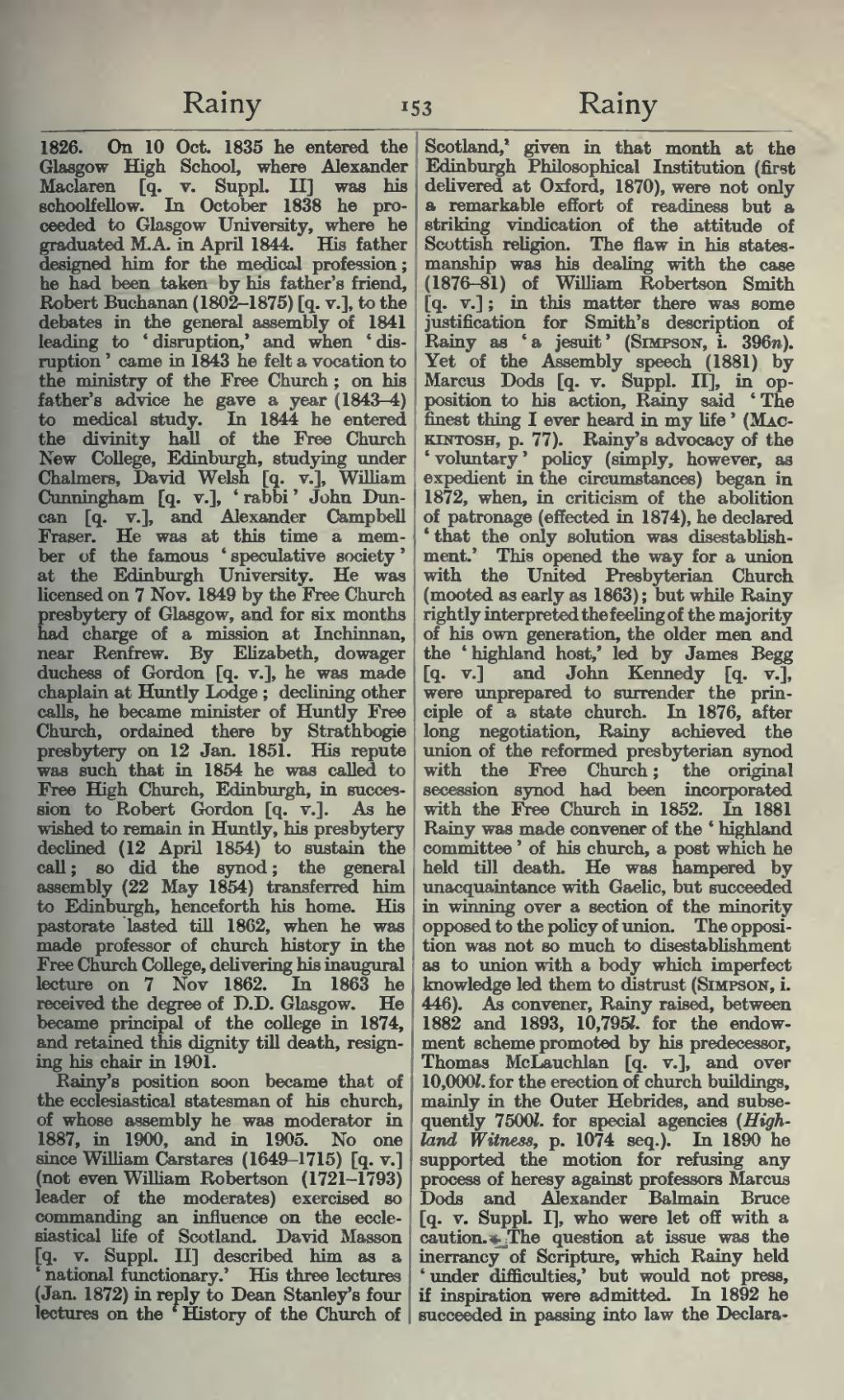1826. On 10 Oct. 1835 he entered the Glasgow High School, where Alexander Maclaren [q. v. Suppl. II] was his schoolfellow. In October 1838 he proceeded to Glasgow University, where he graduated M.A. in April 1844. His father designed him for the medical profession ; he had been taken by his father's friend, Robert Buchanan (1802-1875) [q. v.], to the debates in the general assembly of 1841 leading to 'disruption,' and when 'disruption' came in 1843 he felt a vocation to the ministry of the Free Church ; on his father's advice he gave a year (1843-4) to medical study. In 1844 he entered the divinity haU of the Free Church New College, Edinburgh, studying under Chalmers, David Welsh [q. v.], William Cunningham [q. v.], 'rabbi' John Duncan [q. v.], and Alexander Campbell Fraser, He was at this time a member of the famous 'speculative society' at the Edinburgh University. He was licensed on 7 Nov. 1849 by the Free Church presbytery of Glasgow, and for six months had charge of a mission at Inchinnan, near Renfrew. By Elizabeth, dowager duchess of Gordon [q. v.], he was made chaplain at Huntly Lodge ; declining other caUs, he became minister of Huntly Free Church, ordained there by Strathbogie presbytery on 12 Jan. 1851. His repute was such that in 1854 he was called to Free High Church, Edinburgh, in succession to Robert Gordon [q. v.]. As he wished to remain in Huntly, his presbytery declined (12 April 1854) to sustain the call ; so did the synod ; the general assembly (22 May 1854) transferred him to Edinburgh, henceforth his home. His pastorate lasted till 1862, when he was made professor of church history in the Free Church College, delivering his inaugural lecture on 7 Nov 1862. In 1863 he received the degree of D.D. Glasgow. He became principal of the college in 1874, and retained this dignity till death, resigning his chair in 1901.
Rainy's position soon became that of the ecclesiastical statesman of his church, of whose assembly he was moderator in 1887, in 1900, and in 1905. No one since WiUiam Carstares (1649-1715) [q. v.] (not even WilUam Robertson (1721-1793) leader of the moderates) exercised so commanding an influence on the ecclesiastical life of Scotland. David Masson [q. v. Suppl. II] desciibed him as a 'national functionary.' His three lectures (Jan, 1872) in reply to Dean Stanley's four lectures on the 'History of the Church of Scotland,' given in that month at the Edinburgh Philosophical Institution (first delivered at Oxford, 1870), were not only a remarkable effort of readiness but a striking vindication of the attitude of Scottish religion. The flaw in his statesmanship was his dealing with the case (1876-81) of William Robertson Smith [q. v.] ; in this matter there was some justification for Smith's description of Rainy as 'a Jesuit' (Simpson, i. 396»). Yet of the Assembly speech (1881) by Marcus Dods [q. v. Suppl. II], in opposition to his action. Rainy said 'The finest thing I ever heard in my life' (Mackintosh, p. 77). Rainy's advocacy of the 'voluntary' policy (simply, however, as expedient in the circumstances) began in 1872, when, in criticism of the abolition of patronage (effected in 1874), he declared 'that the only solution was disestablishment.' This opened the way for a union with the United Presbyterian Church (mooted as early as 1863) ; but while Rainy rightly interpreted the feeling of the majority of his own generation, the older men and the 'highland host,' led by James Begg [q. v.] and John Kennedy [q. v.], were unprepared to surrender the principle of a state church. In 1876, after long negotiation. Rainy achieved the union of the reformed presbyterian synod with the Free Church ; the original secession synod had been incorporated with the free Church in 1852. In 1881 Rainy was made convener of the 'highland committee' of his church, a post which he ; held till death. He was hampered by unacquaintance with Gaelic, but succeeded in winning over a section of the minority opposed to the policy of union. The opposition was not so much to disestablishment as to union with a body which imperfect knowledge led them to distrust (Simpson, i. i 446). As convener. Rainy raised, between 1882 and 1893, 10,795l. for the endowment scheme promoted by his predecessor, Thomas McLauchlan [q. v.], and over 10,000l. for the erection of church buildings, mainly in the Outer Hebrides, and subsequently 7500l. for special agencies (Highland Witness, p. 1074 seq.). In 1890 he supported the motion for refusing any process of heresy against professors Marcus Dods and Alexander Balmain Bruce [q. v. Suppl. I], who were let off with a caution. ’The question at issue was the inerrancy of Scripture, which Rainy held 'under difficulties,' but would not press, if inspiration were admitted. In 1892 he succeeded in passing into law the Declara-
